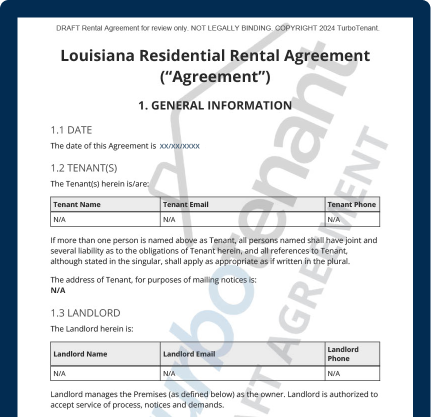Louisiana landlord-tenant law establishes what is and isn’t allowed in lease agreements, but there’s more to it than that. Understanding Louisiana law, which differs significantly from elsewhere in the country, benefits landlords and tenants. If both parties educate themselves about their rights, they can avoid costly legal disputes and ensure a fair rental relationship.
We want to make sure you understand your rights, whether you’re a landlord or tenant, so we put together this comprehensive article. It delves into the particulars of rental laws in the Pelican State, including information on Louisiana tenant rights, evictions, maintenance responsibilities, and more.
Let’s get started.
Key Findings: Landlord-Tenant Rights & Responsibilities
Both landlords and tenants in Louisiana must fulfill their respective responsibilities to receive certain rights. We’ll provide an overview of the most important points below:
Louisiana landlords have the right to:
- Charge an application fee.
- Charge a security deposit.
- Charge rent and late fees for overdue rent.
- Enter the property as necessary.
- Evict tenants as necessary.
Louisiana landlords are responsible for:
- Providing safe, habitable housing.
- Making mandatory disclosures.
- Respecting tenants’ right to privacy.
- Returning the security deposit on time.
- Adhering to the terms of the lease.
Louisiana tenants have the right to:
- Access safe, habitable housing.
- Request repairs from landlords.
- Deduct necessary repair costs from rent.
- Receive the remaining security deposit after moving out.
- A formal eviction process before removal from the property.
Louisiana tenants are responsible for:
- Paying rent in full and on time.
- Using the property as a dwelling unit only.
- Promptly informing the landlord of any necessary repairs.
- Allowing the landlord to access the unit if needed.
- Adhering to the terms of the lease
Best Practices for Screening Prospective Tenants
Louisiana landlord-tenant law allows landlords to charge a rental application fee in any reasonable amount to cover the costs of screening tenants. Landlords may check applicants’ criminal and credit history, though all aspects of the selection process must apply equally to prospective tenants. Landlords must also abide by the Fair Credit Reporting Act.
Moreover, according to Louisiana law, landlords are required to provide written notification of the application fee and the criteria they use to select candidates. They must permit the applicant to submit a statement of up to 200 words detailing how a state or federally declared disaster or emergency has personally affected their credit, employment, or rental history (La. Rev. Stat. § 9:3258.1).
For a detailed credit, criminal, and eviction history report, try TurboTenant’s Tenant Screening software. It’s easy to use and compliant with all state laws.
Compliance with Fair Housing Laws in Louisiana
In Louisiana, federal and state fair housing laws protect tenants’ right to seek safe, habitable housing regardless of race, gender, and familial status. Landlords must adhere to all fair housing regulations when renting a property.
What actions are considered housing discrimination?
Landlords may commit housing discrimination by refusing to rent, utilizing harsher lease terms, charging higher rent, or harassing tenants based on specific factors. Additionally, landlords must advertise to and screen all tenants equally.
Notably, Louisiana law also prohibits discrimination based on natural, protective, or cultural hairstyles (La. Rev. Stat. § 51:2606). In Orleans Parish, additional fair housing laws protect applicants against discrimination based on sexual orientation, gender identity, and other factors.
How can discrimination be avoided in rental practices?
Landlords in Louisiana should advertise to, screen, and rent to all tenants equally. They must also be willing to provide reasonable accommodations for individuals with disabilities to rent the property (La. Rev. Stat. § 51:2606).
Last but not least, landlords should thoroughly train all staff to avoid violating fair housing laws, as landlords will be held liable for discrimination committed by employees.
What are the repercussions for fair housing violations?
Landlords who violate fair housing laws in Louisiana may be subject to legal and financial penalties, such as fines and jail time. Exact penalties vary by locality, but federal fines can cost tens of thousands of dollars.
If would-be tenants accuse them of housing discrimination, landlords should document all evidence in their favor and seek civil legal defense.
Louisiana Lease Agreements
Louisiana lease agreements may be either written or verbal, but we recommend written contracts to clarify lease terms. Leases may operate on a month-to-month basis, in which the contract expires and automatically renews at the end of every month until terminated, or on a fixed-term basis, in which the contract expires on a specific date and must be terminated or renewed.
Which lease terms are legally required in Louisiana?
Louisiana state law does not require landlords to utilize specific lease terms. Generally, most landlords include information regarding rent payment and rental policies.
What constitutes legal renting in Louisiana?
Landlords must ensure their rental property is in safe, habitable condition and operated according to all local building codes and health ordinances. For example, a new Louisiana landlord-tenant law requires air conditioning in New Orleans rental properties.
What tenant documentation is required?
Tenants typically must provide a valid ID, proof of income, and a signed consent form for a background check to rent a property. Landlords and tenants should maintain copies of all documents related to the rental transaction to prevent future disputes over the agreement.
What are the mandatory landlord disclosures in Louisiana?
Under Section 1018 of Title X, landlords must disclose the required application fee information and the known presence of lead-based paint.
Additionally, Louisiana landlords must inform tenants about their rights concerning foreclosure actions and provide details regarding any ongoing foreclosure (La. Rev. Stat. § 9:3260.1).
If a landlord fails to make these disclosures, they could face fines or civil penalties.
Security Deposits in Louisiana
Landlords charge security deposits from tenants to cover the costs of damages to the premises and unpaid rent. As such, these fees are crucial for landlords to protect themselves and their property.
What are the guidelines for security deposit collection?
Louisiana landlord-tenant law does not limit the amount landlords may charge for a security deposit, and landlords are not required to inform tenants about the deposit’s location.
A walk-through checklist is also not required to collect a security deposit. However, to avoid future conflict, the landlord and tenant should both document the condition of the unit at the time of move-in.
When can deductions be made from security deposits?
Landlords in Louisiana may use the security deposit to cover unreasonable damage to the unit and any unpaid rent. As per Louisiana tenant rights, landlords must also provide an itemized statement explaining any deductions made against the deposit (La. Rev. Stat. § 9:3251).
How should security deposits be returned?
The landlord must return any remaining portion of the security deposit and the aforementioned statement of deductions within one month of the tenant’s departure (La. Rev. Stat. § 9:3251).
Maintenance Responsibilities of Landlords
As in other states, Louisiana landlords are responsible for providing safe, habitable housing for tenants. Rental properties must adhere to all relevant building, health, and safety ordinances.
What are the legal standards for property conditions?
As of 2024, Louisiana tenant rights require only that all rental units be “free of vices or defects” that would prevent them from being used as rentals (La. Civ. Code Art. 2696).
What is the proper protocol for repairs?
Landlords in Louisiana must make any necessary repairs to keep the property in rentable condition (La. Civ. Code Art. 2691).
If the landlord fails to make a requested repair within a reasonable amount of time, the tenant may make the repairs and request reimbursement or deduct the cost from the rent. However, the cost must be reasonable, and the repair must be necessary (La. Civ. Code § 2694).
Do landlords need to give tenants advance notice before accessing a rental property?
Louisiana landlord-tenant law does not require landlords to provide advance notice before entering a rental unit. However, landlords should still notify tenants before entering. Repeatedly entering without notice could constitute harassment.
Late Rent Fee Regulations
Louisiana tenant rights do not provide a grace period for paying rent. As soon as the due date for rent passes, landlords may charge late fees in any reasonable amount.
Rent Control in Louisiana
Rent control strictly limits landlords’ ability to raise rent, while rent stabilization allows landlords to increase rent by specific amounts. Neither rent control nor rent stabilization laws exist in Louisiana.
To be clear, landlords may not raise the rent in the middle of a lease term. However, Louisiana law does not require landlords to notify tenants of the intent to increase rent, so rent may be raised at any time by any amount after a lease term concludes.
Lease Renewal and Termination
In Louisiana, landlords may refuse to renew expiring leases for any reason. Depending on the lease length, landlords must give tenants between 5 and 30 days’ notice (La. Civ. Code § 2728). Notice is not required for fixed-term leases (La. Rev. Stat. § 2720).
If a tenant in Louisiana wishes to move out before the lease expires, they typically must continue to pay rent until the original duration ends. However, breaking a lease is permitted in certain situations: starting active-duty military service (50 U.S.C. App. §§501-597b), landlord harassment, or if the unit is unfit for habitation (La. Civ. Code § 2694).
Landlords who want to break the lease before its end date may also do so for certain purposes, such as selling the property or moving in.
Eviction Procedures for Louisiana Landlords
As the eviction process differs from state to state, landlords must be aware of all local tenant removal regulations. Here, we’ll cover some of the most important aspects of the eviction process in Louisiana.
What justifications exist for eviction?
Landlords in Louisiana may evict tenants for good cause, such as failure to pay rent, violating the lease terms, or conducting illegal activity on the premises. Regardless of the exact reason, landlords must thoroughly document all violations to serve as evidence in an eviction suit.
What is the eviction process?
To evict a tenant in Louisiana, landlords must take the following steps:
- Deliver a 5-day notice to vacate (LA CCP § 4701).
- File a rule for possession with the justice of the peace or city court (LA CCP § 4731).
- The sheriff or a law enforcement officer serves the tenant with a summons at least 3 days before the court hearing (LA CCP § 4732).
- The landlord and tenant attend the court hearing to present evidence and receive judgment.
- The judge issues a Writ of Possession to the landlord, providing the tenant 24 hours to appeal or move out (LA CCP § 4735).
- The sheriff or other law enforcement officer forcibly removes the tenant (LA CCP § 4733).
How is property reclaimed after eviction?
The landlord may secure the premises once law enforcement removes the tenant or they leave of their own free will. Louisiana landlord-tenant law in 2024 does not specify how landlords should deal with personal property left behind by the tenant, so landlords may dispose of abandoned belongings in any manner deemed fit.
Local Ordinances for Landlords and Tenants
While Louisiana laws apply to all rental situations within the state, certain municipalities and parishes have specific housing laws. Landlords and tenants can learn more about local regulations through resources like Municode.
Federal Landlord-Tenant Laws
In addition to state and local laws, federal landlord-tenant regulations, such as the Fair Housing Act, the Americans with Disabilities Act, and Title X, affect rental housing nationwide.
Visit the websites of the Consumer Financial Protection Bureau and the Office of Housing and Urban Development to learn about applicable federal rental laws.
Managing Tenant Legal Disputes as a Louisiana Landlord
When facing tenant disputes, landlords should always attempt to resolve conflicts as amicably and directly as possible. However, if further legal assistance is required, landlords or tenants in Louisiana may reach out to the following resources:
- LouisianaLawHelp.org: Helps low-income and senior Louisiana residents understand the civil legal system
- Louisiana Civil Legal Navigator: Provides referrals and customized answers to landlord-tenant law questions
- Acadiana Legal Service Corporation: Free civil legal services for low-income clients, including a Louisiana tenant rights hotline
- Louisiana Bar Foundation: Offers pro bono civil legal aid to all residents, regardless of background
Navigate Your Landlord-Tenant Relationship with TurboTenant
We get it—Louisiana landlord-tenant laws can be confusing. That’s why TurboTenant’s free property management software is here to help you comply with it. Our top features include:
- Rental applications you can customize to your property
- Detailed tenant screening that abides by fair housing laws
- State-specific lease agreement templates to construct a lease per Louisiana tenant rights
- Rent collection software to remind tenants when rent is due to help avoid lease violations
Sign up for a free TurboTenant account today to take the headaches out of property rental in Louisiana.
Louisiana Landlord-Tenant Law
What are landlords required to provide by law?
Louisiana landlords must follow lease terms and ensure their rental properties are safe and habitable in accordance with all relevant laws. Due to local market standards, tenants may expect certain additional amenities.
What is the proper notice period for lease termination?
Notice periods for lease termination in Louisiana vary between 5 and 30 days, depending on the length of the lease and the reason for termination.
How should utilities be handled in rental agreements?
Under Louisiana law, the landlord or the tenant may be responsible for paying utilities. The lease should clearly outline this responsibility; disputes may need to be settled through costly and time-consuming legal action.
What maintenance rights do tenants have?
Louisiana tenants have the right to request repairs from their landlords. If the landlord does not complete the repair in a timely manner, the tenant may undertake the repair themselves and request reimbursement or deduct the cost from the rent.
What are the eviction rules for tenants without a lease?
Since leases may be written or oral in Louisiana, most tenant rights still apply to tenants with no lease. Thus, landlords must follow the typical eviction proceedings to evict a tenant without a lease.
How are guests and tenants legally differentiated?
Guests do not receive tenant rights and do not have to pay rent or adhere to a lease, but they may visit a property for short periods of time. Tenants, meanwhile, live full-time on the premises and receive tenant rights in exchange for paying rent and abiding by the lease.





